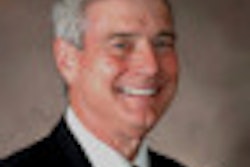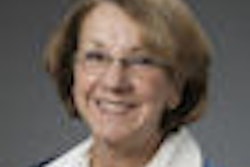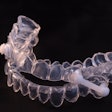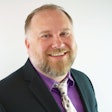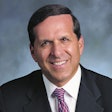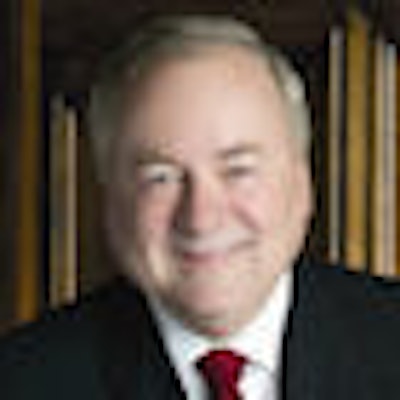
One morning last October, newly installed ADA president Mark Feldman, D.D.S., found a public relations disaster neatly folded in his driveway. "Boom time for dentists but not for teeth," read a headline in the New York Times. The article went on to claim that dentists' incomes had risen while dental health in the U.S. declined.
The reporter for that article and a follow-up story may have confused some of his facts, but the articles were only the beginning. Report after report has followed in other media: indigent patients camping out at free clinics, outrage over a boy's death from an abscessed tooth, and children strapped to their chairs by dentists specializing in Medicaid cases.
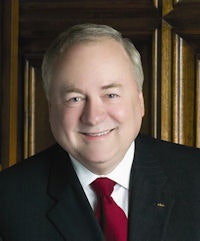 |
| Dr. John Findley, D.D.S., is the new president of the ADA. Photo courtesy of the ADA. |
Under Dr. Feldman, the ADA had worked to position itself on the right side of these events. But as the new president, John Findley, D.D.S., takes the reins of the 150-year-old organization, he acknowledged he may have a rough ride ahead.
"We've got to do more than we've done in the past, and it's got to be better than in the past," he told DrBicuspid.com. "We've got a huge access problem in this country. It's the most pressing problem we face as a profession because people are looking to us for definitive answers."
Dr. Findley didn't outline any new initiatives to improve access to care, but said the organization would continue its efforts in three areas:
Prevent dental diseases by, for example, educating the public about the need for community water fluoridation.
Increase government subsidies for treating indigent patients. The ADA has focused on more reimbursement through Medicaid and expanding the State Children's Health Insurance Program (SCHIP). Dr. Findley said it would continue lobbying for these programs.
"No child in this country should go to bed with a toothache or wake up with an infection," he said. "And that's within the realm of our profession to keep from happening. We just gotta do it."
Bring more dentists to underserved areas. Many parts of the country lack dentists, particularly remote rural areas and inner city neighborhoods. Increasing government subsidies will help entice dentists to these places, Dr. Findley said.
And he added that community dental health coordinators (CDHC), a new category of dental professional the ADA is supporting, would also increase service in these areas. The CDHCs would not replace the need for dentists in underserved areas, he said, but would at least make more efficient use of dentists' time.
"They will be able to serve as a triage entity," Dr. Findley said. "They will see the problem, they will advise the person they are dealing with, and they will know of the transportation services possibilities and of the dentist and the facility possibilities. We can expand someone's touch with a dentist, even though the dentist may not be right there."
The CDHC is one of three competing models of midlevel practitioner. Hygienists have proposed more privileges and autonomy for those of their profession who get more training. And in Alaska, dental health aide therapists are already pulling teeth and filling cavities. The ADA has opposed these programs.
The issue is hardly a new one for Dr. Findley, who previously served as president of the Texas Dental Association (TDA).
"Dr. Findley was instrumental in revamping the legislative committee," said Michael Stuart, D.D.S., a Sunnyvale, TX, general dentist who worked with him at the TDA. As an example of the TDA's successful lobbying, Dr. Stuart cited its success in blocking legislation to give hygienists the right to administer anesthesia.
As ADA president, Dr. Findley is so far striking a more conciliatory tone. "It's time for us to quit saying 'no,' " he said. He noted that his own sister is a hygienist. "We have an opportunity to sit down with them, and we both do what we do best in providing levels of care. Have there been problems where there have been misunderstandings? Absolutely. [But] we believe that this new cooperation can lead to better care for people in all parts of the country."
Multiple challenges
As central as it may be, access to care is not the only issue that Dr. Findley will face over the next year. "Right now is a very trying time for John and the new board of trustees," said Joel F. Glover, D.D.S., a retired Reno, NV, dentist who competed with Dr. Findley for the ADA presidency.
He pointed out that the president must also do the work of the executive director. The organization's past executive director, James Bramson, D.D.S., was dismissed for undisclosed reasons in April. Since then, Dr. Feldman -- and now Dr. Findley -- has done the work of both president and executive director.
In addition last year, the ADA came under fire for lending its logo to a series of advertisements for the oral cancer BrushTest by OralCDx. Critics said the ads exaggerated the effectiveness of the test and gave the appearance of an ADA endorsement.
"There was no ADA endorsement implied in that," said Dr. Findley, adding that public health advertising is central to ADA's mission. "When you have a chance to advance public awareness, that's great," he said.
Asked if he had any regrets about the way campaign was conducted, he said, "The only thing I can tell you is that we're in a continuous mode of being aware of the need to do better and do more, and we'll conduct our campaigns where they reflect on what's best for the patient and raise awareness."
Dr. Findley brings decades of experience to these challenges. In addition to serving as a trustee and president-elect for the ADA, a past president of the TDA and of the Dallas Dental Society, Dr. Findley was mayor of Crossroads, TX. He has a general practice in Plano, TX.
"He has really sacrificed a lot of practice hours and financial benefit to serve at that level," said Dr. Stuart, who was Dr. Findley's campaign chair. "He's a real wet-glove dentist. He's like all of us in that he struggles day to day to make a living and do what's best for his patients."
An ADA spokesman said he could not disclose Dr. Findley's current salary, but noted that public records show the ADA paid its president $367,224 and its president-elect $181,150 in 2007.




